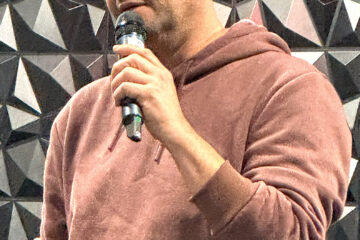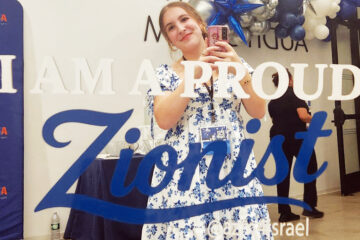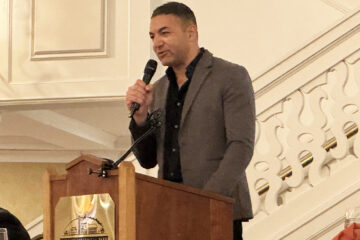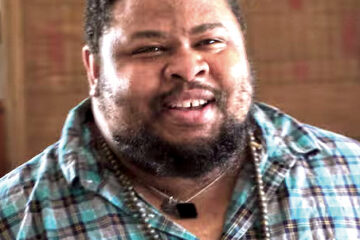As Beth Jacob approaches 150 years, congregation returns to Orthodoxy
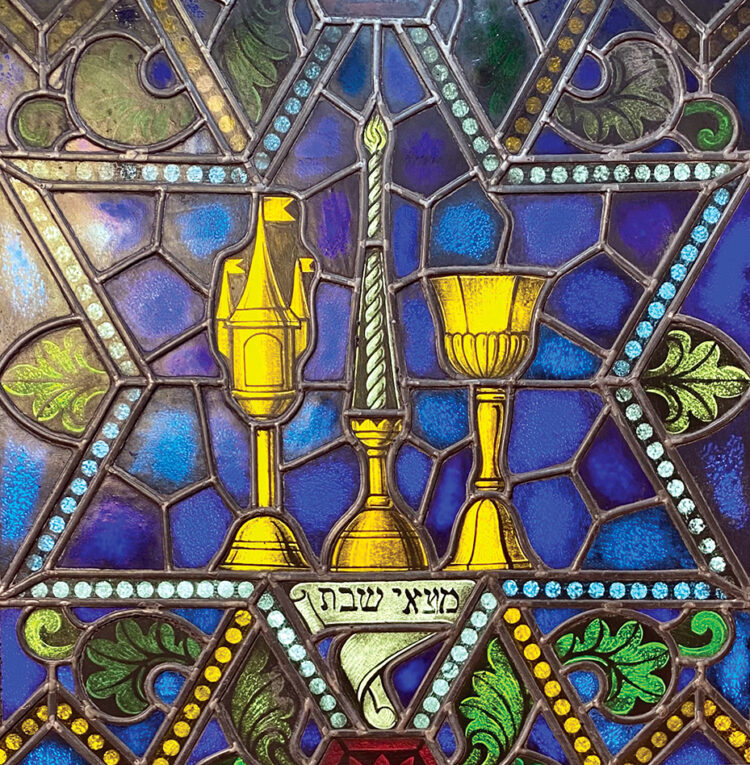
Members vote for synagogue to become Modern Orthodox and to affiliate with Orthodox Union
By Marshall Weiss, The Observer
As of Nov. 10, Beth Jacob Congregation now identifies as a Modern Orthodox synagogue, with separate seating for men and women on either side of a mechitzah (physical divider).
That was the day its members voted for the synagogue to affiliate with the Orthodox Union, an umbrella organization that supports a network of more than 400 synagogues in the United States.
Since Beth Jacob moved to its current building at 7020 N. Main St. in Harrison Township in 1980, men and women have been able to sit next to each other, although congregational services have always been led by men only.
From that point until this fall, Beth Jacob called itself a “Traditional” synagogue.
In the mid-1990s and into the 2000s, the synagogue offered some separate seating on opposite sides in the rear of the main sanctuary, and a mechitzah in a second service held in Beth Jacob’s library.
A mechitzah would also be set up in the main sanctuary and small chapel when Orthodox guest speakers visited the shul.
Occasionally, Beth Jacob in that era would hold a separate service for women only, led by women.
The congregational vote sets Beth Jacob apart as the only Modern Orthodox synagogue in the Dayton area.
Beth Jacob is now the second Orthodox Jewish organization here to offer worship services with a mechitzah, along with Chabad of Greater Dayton in Oakwood.
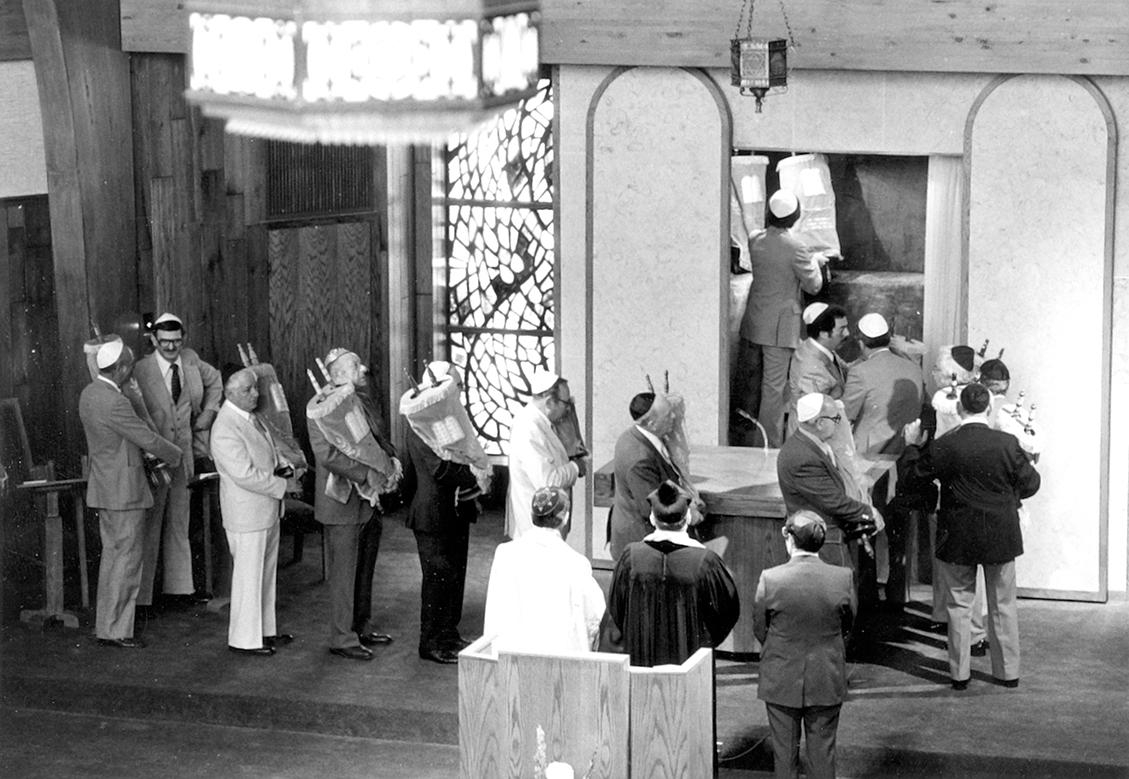
In a letter to congregants after the Nov. 10 vote, Beth Jacob’s board wrote that “an overwhelming majority of those present and mail-in ballots voted to make this change to reactivate our OU membership.”
Beth Jacob Vice President Lisa Harlan, Secretary Helen Halcomb, and board member Jese Shell wrote in a statement for The Observer that the change will provide Beth Jacob with the greatest opportunity for growth and expansion.
“The board, and now the members have spoken as well, and agree that our best future direction would be to become Modern Orthodox to attract those looking for an Ashkenazi, Modern Orthodox congregation.”
My Jewish Learning describes Modern Orthodoxy as attempting “to harmonize traditional observance of Jewish law within modern life,” and that it endorses secular academic studies.
According to Harlan, Halcomb, and Shell’s statement, Beth Jacob began the process of long-term planning, including consulting the OU, about a year ago.
“In order to take advantage of OU resources, we determined that we needed to become a Modern Orthodox congregation with any changes it would entail.”
The statement goes on to say that other than separated mechitzah seating for men and women, the OU requires no other changes to the shul.
Back to its roots
Beth Jacob membership’s decision to become Orthodox is a return to the nearly 150-year-old synagogue’s roots.
In 1875, two years after Dayton’s first and only Jewish congregation (now Temple Israel) formally identified with the Reform movement, it also switched to egalitarian seating and an egalitarian choir.
This was the year three of Dayton’s Jews — Leonard Boutelege, Jacob Wolf, and Julius Wolf — formed House of Jacob Synagogue.
With the great wave of Eastern European Jewish immigration to America beginning in 1881, Beth Jacob would become the synagogue of Dayton’s Orthodox Jews who had fled persecution across the Russian Empire.
A second Orthodox synagogue, Beth Abraham, formed in 1894 for Jews from Lithuania. It’s now the Dayton area’s only Conservative synagogue.
In the 1880s and 1890s, terms such as “Orthodox,” “Traditionalist,” and “Conservative” were used interchangeably for what is now called Orthodox Judaism.
The leaders of these “non-Reform” Jews in the United States established the Jewish Theological Seminary in New York in 1886 and the Orthodox Union, also in New York, in 1898.

JTS and the OU parted ways in the years after Rabbi Solomon Schechter arrived from England to lead JTS in 1902. JTS would become the flagship institution of the Conservative Jewish movement, which would eliminate mechitzah use in the 1920s. By the 1940s, the Conservative movement officially allowed egalitarian seating.
Beth Jacob Congregation permitted egalitarian seating in its worship services as far back as 1974, in its previous location on Kumler Avenue in Dayton View.
Prior to that, men and women sat separately there, divided by a middle aisle. As was common among Orthodox synagogues in the Midwest going back to the 1950s, there was no mechitzah separating the sexes.
The statement from Beth Jacob leaders to The Observer also noted that the synagogue has always maintained its OU membership, but “didn’t continue to utilize or seek out OU services and programming.”
Beth Jacob’s part-time rabbi, Leibel Agar, is not required to receive OU approval to continue in his role.
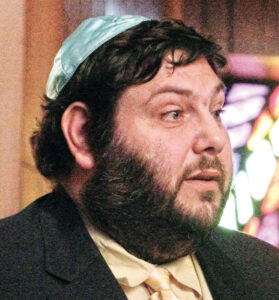
Rabbi Leibel Agar. Photo: Peter Wine.
Agar, who has served Beth Jacob for five years, received his Orthodox rabbinic ordination from Yeshivat Shomrei Tzedek in England under the auspices of Rabbi Yitzchak Aldman.
Beth Jacob will receive numerous benefits from the OU as a Modern Orthodox congregation: relocation services for new synagogue members, a pipeline to hire a cantor for the High Holidays, workshops, Shabbatons, and leadership assistance.
The Beth Jacob statement added that the OU works with small congregations on board and volunteer training, growth initiatives, member engagement programs, member outreach, OU Women’s Initiative, and programming for teenagers and Jews with special needs.
Beth Jacob currently has 41 primary in-town memberships, approximately 6% of in-town memberships of all seven Jewish congregations across the Dayton area. In 2015, Beth Jacob had 86 primary in-town memberships, 9.4% of the area total.
Overall, primary in-town Jewish congregation memberships across the Dayton area decreased 14.8% from 2015 to 2023.
“Our membership has spoken and indicated that they are willing to make the move to become a Modern Orthodox congregation and be affiliated with OU in order to bring the resources that they have to offer to the Beth Jacob Congregation and our Dayton Jewish community,” the leadership statement to The Observer said.
“While change can be difficult and emotional, our family of congregants recognized this and voted to make a change that will positively impact the future of Beth Jacob and its continued presence in the Dayton area. This change also opens new possibilities to connect our members to the greater Orthodox Jewish community and allows Beth Jacob an opportunity to network with and engage with new partners in the Jewish world. Although our congregation is Modern Orthodox, we welcome all Jews regardless of their affiliation. Our congregation is inclusive and non-judgmental and warmly welcomes anyone wishing to observe, learn, and enjoy Judaism regardless of background or personal level of observance.”
To read the complete December 2024 Dayton Jewish Observer, click here.


